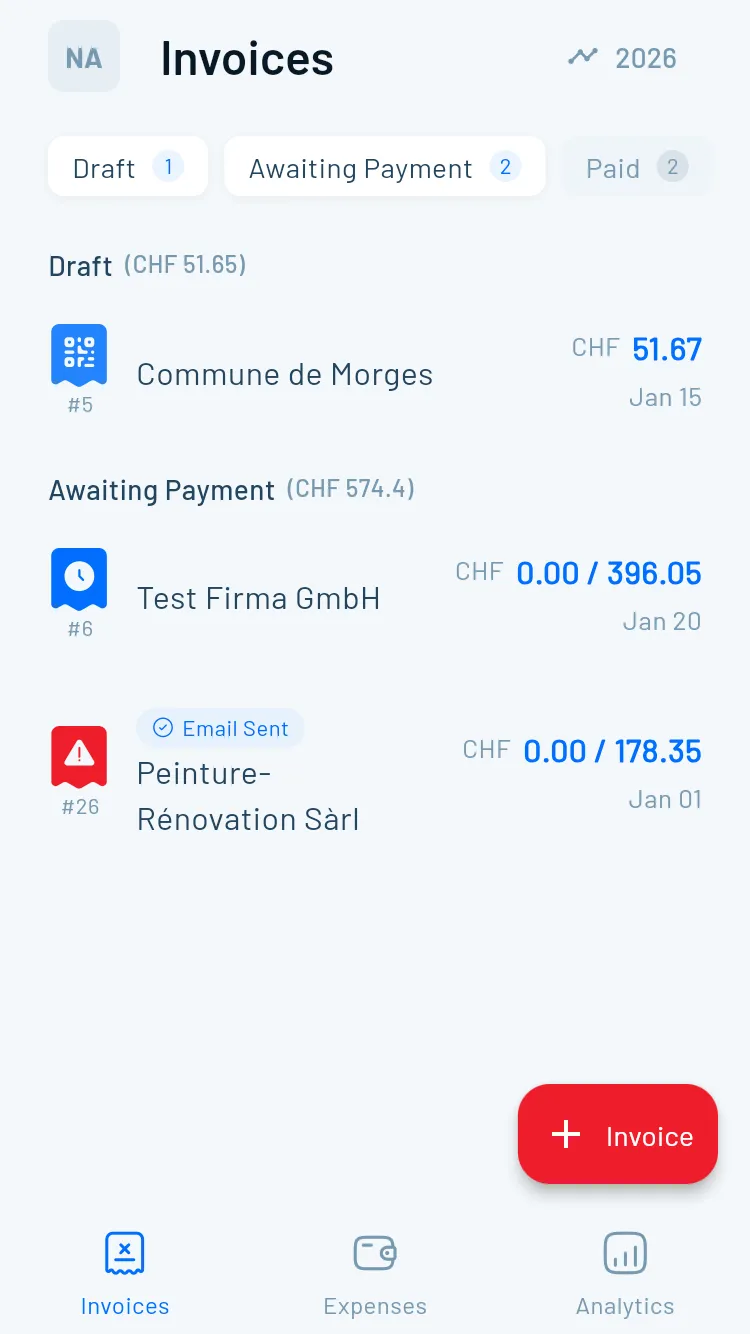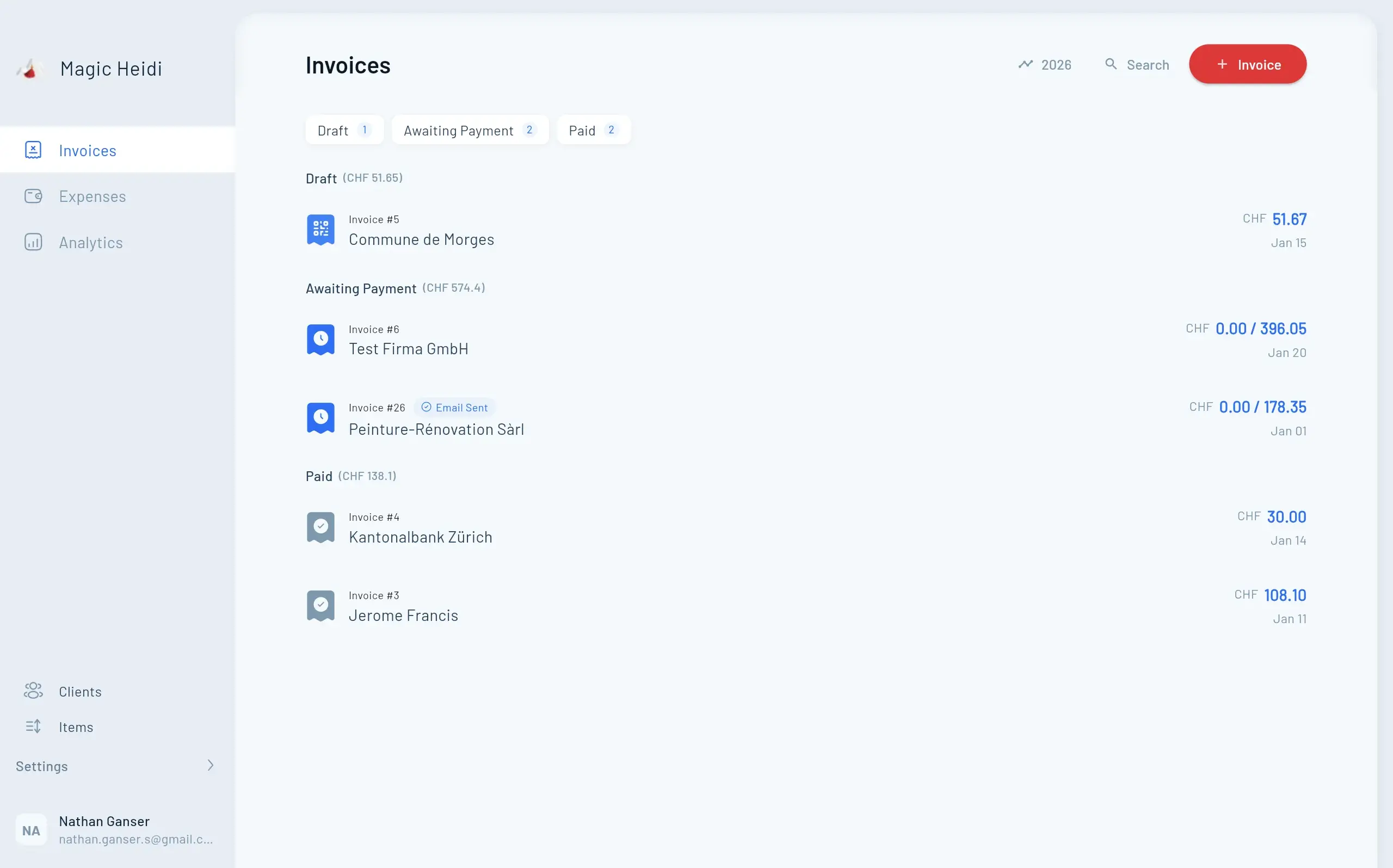Can You Invoice Without Being Self-Employed?
Earn up to CHF 2,500 annually without formal registration. But there's more to the story—and getting it wrong could mean retroactive contributions and penalties.

You've earned CHF 1,800 from weekend tutoring sessions. A former colleague wants to hire you for a consulting project worth CHF 3,000. Your hobby photography is generating occasional income.
The question keeping you up at night: Do you need to register as self-employed?
The short answer: If your secondary self-employment income stays below CHF 2,500 annually and you meet certain conditions, you can invoice as a private individual without formal registration.
But the threshold rules changed in 2025, and this guide breaks down exactly when you can bill clients without self-employment status—and when registration becomes mandatory.
The CHF 2,500 Threshold.
What You Need to Know.
Understanding when you can invoice as a private individual—and when registration becomes mandatory.
Under CHF 2,500
Invoice as private individual if already employed or receiving benefitsAbove CHF 2,500
Must register with compensation office and pay AHV contributionsCHF 100,000+
Mandatory VAT registration and Commercial Register entryQuick Reference: The 2025 Rules
You can invoice without registering if:
- Your self-employment is a secondary activity (not your main income source)
- Annual earnings from self-employment stay at or below CHF 2,500
- You're already employed, receiving unemployment benefits, OR your spouse pays sufficient AHV contributions
You must register as self-employed when:
- Secondary self-employment income exceeds CHF 2,500 per year
- Self-employment becomes your primary activity (regardless of amount)
- You meet multiple criteria indicating genuine self-employment status
The CHF 100,000 milestone triggers:
- Mandatory VAT registration
- Commercial Register obligation
- Additional compliance requirements
How Switzerland Classifies Workers
The Swiss social security system draws a clear line between employed and self-employed workers—but many people operate in both categories simultaneously.
Employed Workers
Employer automatically deducts AHV/IV/EO, BVG, and matching contributions. You never see this money—it's withheld before salary reaches your account.
Self-Employed Workers
Pay contributions directly to compensation office based on income reported for direct federal tax. No employer matching—you pay the full amount quarterly or annually.
Hybrid Status
You can be employed in one activity and self-employed in another. Sarah works full-time in marketing while freelancing graphic design on weekends—completely legal.
When Secondary Self-Employment Stays Exempt
The threshold applies specifically to secondary self-employment—not your primary income source. If you hold regular employment, receive unemployment benefits, or your spouse pays sufficient AHV contributions, you can earn up to CHF 2,500 without registration.

Real Examples: Under the CHF 2,500 Threshold
Occasional babysitter: Lisa works as a teacher and babysits for three families on weekends. Annual babysitting income: CHF 2,200. Since she's already employed and earns below CHF 2,500 from babysitting, she doesn't need to register as self-employed. She writes simple invoices as a private individual.
Weekend musician: Marc performs at weddings and events, earning CHF 1,800 yearly. He works full-time as an accountant. His music income falls below the threshold and remains secondary to his main employment. No self-employment registration required.
Small-scale beekeeper: Anna sells honey from her backyard hives, generating CHF 900 annually. She's employed part-time at a pharmacy. The honey sales stay well below CHF 2,500, so she invoices customers as a private individual without registering as self-employed.
When the Threshold Doesn't Apply
The CHF 2,500 exemption disappears if:
Your self-employment becomes primary: If you quit your job to focus on your side business, you must register immediately—even if income stays below CHF 2,500.
You lack other AHV coverage: If you're not employed, not receiving benefits, and your spouse doesn't pay AHV contributions, the threshold doesn't apply. You must register regardless of income level.
You meet multiple self-employment criteria: Compensation offices look beyond income. If you're operating like a genuine business (multiple clients, business premises, employees), registration becomes mandatory.
How to Invoice as a Private Individual
When your income stays below the threshold, you can write invoices as a private individual—but specific rules apply to ensure compliance.

What Your Invoice Must Include
A valid invoice from a private individual requires:
- Your full name and address
- Client's name and address
- Invoice date and unique invoice number
- Clear description of services or products
- Total amount due in CHF
- Payment terms and bank details
Critical: What NOT to include:
- ❌ No VAT (you're not VAT-registered)
- ❌ No company name or business designation
- ❌ No AHV number (unless specifically requested)
- ❌ No business logo or branding (optional, but suggests business activity)
Sample Invoice Template
[Your Full Name]
[Your Street Address]
[Postal Code] [City]
Invoice #2025-001
Date: [Current Date]
Bill to:
[Client Name]
[Client Address]
Description of Services:
- Private tutoring sessions (5 hours @ CHF 60/hour)
Total Amount Due: CHF 300.00
Payment Terms: Due within 30 days
Bank Details: IBAN CH00 0000 0000 0000 0000 0
Record-Keeping Requirements: Even below the threshold, maintain copies of all invoices, payment confirmations, expense receipts, and an annual income summary. These records prove your income level if the compensation office questions your status.
When You Must Register as Self-Employed
Once you cross the CHF 2,500 threshold or meet certain criteria, registration becomes mandatory.
The CHF 2,500+ Trigger
Thomas earns CHF 2,800 from freelance web development while working part-time. He crossed the threshold and must register with his cantonal compensation office within the first months of the calendar year. Registration applies retroactively to January 1st.
- Register with cantonal compensation office
- Applies retroactively to January 1st
- Required even for secondary activity
- Track income carefully throughout year
The Nine Assessment Criteria
Compensation offices evaluate self-employment status beyond income thresholds. You don't need all nine criteria—meeting 4-5 indicators typically leads to classification.
- Working under your own name
- Shouldering economic risk and investments
- Independent organization and scheduling
- Multiple clients (not single customer)
- Employing staff or subcontractors
- Own infrastructure and business premises
- Active marketing and advertising
- Professional qualifications or certification
- Duration and continuity of activity
Step-by-Step Registration
Registration typically processes within 4-8 weeks. Start early—retroactive contributions apply from January 1st of your start year.
- Gather invoices and client documentation
- Contact your cantonal compensation office
- Complete registration forms with estimates
- Receive formal decision confirming status
- Set up quarterly or annual payment schedule
Understanding Self-Employment Contribution Rates
Self-employed contributions differ significantly from employee deductions. Switzerland uses a progressive rate structure.
Up to CHF 60,500
Degressive rates between 5.371% and 9.321%. Lower incomes pay lower percentages, gradually increasing.
CHF 60,500 and Above
Flat 10% rate on all income. Simplifies calculation for higher earners.
Below CHF 10,100
Minimum contribution of CHF 530 regardless of actual income level.
Payment Schedule
Quarterly or semi-annual provisional payments based on estimates, with annual reconciliation after tax filing.
Contribution Calculation Examples
Example 1: Part-time self-employment
- Annual income: CHF 25,000
- Approximate rate: ~7.5%
- Annual contribution: ~CHF 1,875
Example 2: Full-time below threshold
- Annual income: CHF 55,000
- Approximate rate: ~9%
- Annual contribution: ~CHF 4,950
Example 3: Full-time above threshold
- Annual income: CHF 80,000
- Rate: 10%
- Annual contribution: CHF 8,000
Example 4: Very low income
- Annual income: CHF 8,000
- Minimum contribution: CHF 530
Critical deadline: Estimate conservatively. Underestimating income leads to surprise bills later—potentially thousands of francs you didn't budget for.
The CHF 100,000 Milestones.
VAT and Commercial Register.
When annual turnover reaches CHF 100,000, two new obligations trigger simultaneously—changing how you operate your business.
Mandatory VAT
Register with FTA, add 8.1% VAT to invoices, file quarterly returnsCommercial Register
Public registration, annual fees CHF 200-600, enhanced credibilityBusiness Banking
Access to company credit cards and insurance productsMaria's Journey: Crossing Both Thresholds
Year 1: CHF 45,000 turnover
- No VAT registration needed
- No Commercial Register entry required
- Simple private individual invoicing
Year 2: CHF 85,000 turnover
- Still below both thresholds
- Continued monitoring growth
Year 3: CHF 115,000 turnover
- Registered with FTA for VAT in January
- Began charging 8.1% VAT on all invoices
- Filed quarterly VAT returns
- Registered sole proprietorship in Commercial Register
- Adjusted pricing to account for VAT obligations
Voluntary early registration: You can register for VAT below CHF 100,000 if advantageous—makes sense when you have substantial deductible business expenses.
Common Questions and Edge Cases
Foreign nationals, retirees, students, and part-time workers face unique considerations.
Foreign Nationals
EU/EFTA nationals with Permit B can register as self-employed. Non-EU nationals generally need Permit C. Cross-border commuters (Permit G) face additional administrative hurdles.
Retirees Past Reference Age
After reaching reference age, AHV contributions aren't mandatory on income up to CHF 16,800 per year. Above that threshold, different solidarity contribution rates apply.
Students
Can engage in self-employment while studying. Income below CHF 2,500 from secondary activity doesn't require registration if parents pay AHV or student has part-time employment.
Part-Time Workers
Most common hybrid scenario. Track both income sources separately. Self-employment registration required when side income exceeds CHF 2,500 annually.
Summary: Income Levels and Requirements
A quick reference guide to Swiss self-employment thresholds in 2025.
| Income/Revenue Level | Requirements |
|---|---|
| Up to CHF 2,500/year (secondary) | No AHV registration required (if conditions met); must declare on tax return |
| Above CHF 2,500/year | Must register with compensation office; pay AHV contributions |
| CHF 10,100/year | Minimum AHV contribution of CHF 530 applies |
| CHF 60,500/year | Maximum AHV rate of 10% triggers |
| CHF 100,000/year | Mandatory VAT registration and Commercial Register entry |
Common Mistakes to Avoid
Mistake 1: Assuming calendar year equals tax year Self-employment status applies from January 1st of the year you start, even if you begin in November. Budget for potential retroactive contributions.
Mistake 2: Waiting for the compensation office to contact you You must initiate registration. The office won't find you automatically. Delayed registration can result in penalties and retroactive contribution demands.
Mistake 3: Mixing personal and business finances Even below the CHF 2,500 threshold, maintain separate tracking. A dedicated business account simplifies record-keeping and tax filing.
Mistake 4: Forgetting about tax obligations The AHV threshold doesn't affect income tax. All self-employment income, even CHF 500, must appear on your tax return.
Mistake 5: Underestimating first-year income "I'll probably earn CHF 2,000" often becomes CHF 5,000 by year-end. Register proactively if you're uncertain—it's easier than retroactive compliance.
Mistake 6: Ignoring permit restrictions Foreign nationals: Verify your permit allows self-employment before invoicing clients. Working without authorization can jeopardize your residence status.
Frequently Asked Questions
Can I invoice clients as a private individual?
Yes, if your secondary self-employment income stays at or below CHF 2,500 annually and you're already employed, receiving benefits, or your spouse pays AHV contributions. You must still declare this income on your tax return.
What happens if I exceed CHF 2,500 mid-year?
You must register with your cantonal compensation office within the first months after crossing the threshold. Registration applies retroactively to January 1st of that year, and you'll need to pay contributions on all income earned.
Do I need to register a company name?
Not until you reach CHF 100,000 in annual turnover, which triggers mandatory Commercial Register entry. Below that threshold, you can operate under your personal name as a sole proprietor.
How do I know which compensation office to contact?
Each canton operates its own office. Find yours at ahv-iv.ch. Contact them by phone or in-person visit to initiate registration and receive guidance specific to your situation.
Can I voluntarily register for VAT below CHF 100,000?
Yes, voluntary VAT registration makes sense when you have substantial deductible business expenses. This allows you to claim input tax deductions, potentially reducing your overall tax burden.
What if I'm both employed and self-employed?
This hybrid arrangement is completely legal and increasingly common. Your compensation office assesses each activity separately. As long as your self-employment remains secondary and stays below CHF 2,500, no separate registration is needed.
Your Action Plan
Whether you're staying below the threshold or ready to register, here's what to do next.
Below CHF 2,500
Track income monthly, create alerts at CHF 2,000, maintain documentation, consider deferring projects to new tax year if approaching threshold.
Crossed CHF 2,500
Week 1: Gather documentation. Week 2: Contact compensation office. Week 3: Complete registration. Week 4: Arrange finances for quarterly payments.
Approaching CHF 100,000
Three months before: Research VAT requirements. At threshold: Register with FTA and Commercial Register, update invoice templates, notify clients.
Seek Professional Advice
Consult fiduciary or tax advisor for fluctuating income, multiple cantons, international clients, or complex situations. Cost: CHF 150-300 for initial consultation.
Let Magic Heidi Handle the Details
Managing thresholds, invoices, and social contributions doesn't have to be complicated. Create compliant invoices in seconds, track income against AHV thresholds automatically, and stay ready for tax season.

Built for Swiss Freelancers
Whether you're billing your first CHF 500 or managing CHF 500,000 in annual turnover, Magic Heidi adapts to your needs—from private individual invoicing to full VAT-registered business accounting.
- 🧾Compliant Invoicing
Create Swiss-compliant invoices in seconds with automatic QR-bill generation
- 📊Threshold Tracking
Automatically monitor income against CHF 2,500 and CHF 100,000 thresholds
- 💰Expense Management
Track deductible expenses with AI-powered receipt scanning
- 🌍Multilingual Support
Full support for German, French, Italian, and English
- Invoice #3
Magic Heidi
CHF 500
Jan 29
- Invoice #2
Webbiger LTD
CHF 2000
Jan 24
- Invoice #1
John Doe
CHF 600
Jan 20
Start Managing Your Swiss Self-Employment Today
Free trial. No credit card required. Full features unlocked.
Last updated: January 2025 | Next review: January 2026
This guide reflects 2025 AHV contribution rates and thresholds. While we strive for accuracy, Swiss social security regulations evolve regularly. For personalized advice regarding your specific situation, consult your cantonal compensation office or a licensed Swiss tax advisor.